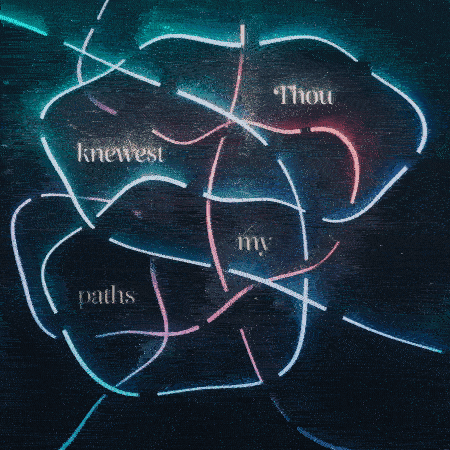When my spirit failed me, then thou knewest my paths. In this way wherein I walked, they have hidden a snare for me. (Psalm 141:4 DR)
We have a bone-headedly stupid expression in English wherein we say that what you don’t know can’t hurt you. A moment’s reflection would render such an aphorism risible, for not only are there many things we don’t know that certainly can hurt us, but that in fact is one of the primary ways in which we do get hurt. To know that some sort of danger exists at least affords the possibility of avoiding it, but not knowing it is right around the corner often leads to disaster.
Of course, the reason we have this expression is not that we believe it but rather because it provides us the presumed moral cover to do evil to others on the grounds that they cannot be hurt by that evil if they are ignorant of it. Often this is manifested in talking about someone behind their back, and while on some level they are not directly hurt by it in that we do not see the immediate reaction from them, in reality even a harm to someone’s reputation or something similar is still an actual harm, whether they know it or not.
It is when they come to that knowledge that the harm which already exists is brought to bear. Much like having a disease that doesn’t immediately present symptoms, the illness is actually present and causing harm; it’s when the diagnosis is given that the full weight of that harm is understood and felt. To be sure, there is a real shift here in the mind and heart of the person when they come to this knowledge, for as finite and time-bound creatures our coming to knowledge has a real effect. But this shift is us bringing our intellect into conformity with the reality that already exists.
As the Psalmist continues this poignant Psalm, he connects God’s knowledge with the failure of his spirit, in that he says when my spirit failed me, then Thou knewest my paths. St. Augustine connects the phrase when my spirit failed me with the immediately preceding clause so as to read: and before Him I will declare my trouble, when my spirit failed me. That is, when his spirit failed him is when he pours out his prayer before the Lord and declares his trouble:
For, in His sight, is the same as before Him; I will proclaim my tribulation, is the same as, I will pour out my prayer. When do you do this? Being set in the midst of persecution, he says, while my spirit failed from me. Wherefore has your spirit failed, O martyr, set in tribulation? That I may not claim my strength as my own, that I may know that Another works in me the goodness I have. (St. Augustine, Expositions on the Psalms, 141, 5.)
The same understanding is embedded in the English rendering as it is set as a clause immediately explicating the preceding phrase, but the English rendering tends to emphasize the connection of then with the when. That is, when my spirit failed me, then Thou knewest my paths, which can give the impression that it was at the moment when the Psalmist’s spirit failed that God then knew his paths. The Vulgate has in deficiendo ex me spiritum meum, et tu cognovisti semitas meas, which could also be rendered as when my spirit failed me, and Thou knewest my paths. In this respect the word then in the Douay-Rheims is not describing a transition from one state to another—that is, from ignorance to knowledge—but rather is looking at a snapshot in time, in that even in the moment of distress, God knew his paths.
At the same time, there is perhaps a sense in which there is a transition from ignorance to knowledge, but rather than being on the part of God, it is on the part of the Psalmist. God’s knowledge of his paths is an always present reality, but the Psalmist’s comprehension of the totality of God’s encompassing knowledge is not. It is now, however, in his moment of distress and greatest weakness and vulnerability that he finally understands that God is with him, that God knewest my paths. The distress of his circumstances leads to a humility of heart and mind in which he no longer knows what to do; it is then that he understands God’s encompassing care for him, and thus it is when his spirit failed him that then Thou knewest my paths:
For every man who followeth his own spirit is proud. Let him subdue his own spirit, that he may receive the Spirit of God. He climbed to the top, let him settle down in the valley. If he climb to the top, the water flows down from him: if he settle in the valley, he shall be filled with it, and become that belly whereof is said, Out of his belly shall flow rivers of living waters. Therefore, while my spirit failed me, in Thy sight did I proclaim my tribulation, being humbled, confessing to Thee with mine own spirit failing, while I am full of Thy Spirit. (St. Augustine, Expositions on the Psalms, 141, 5.)
The Psalmist now draws a connection between his paths which the Lord knew and the way wherein he walked. The knowledge of these paths on the part of God is now brought to bear, for this knowledge is not a mere apprehension of a reality which exists—for God knows all things—but rather the distinction between the way of the righteous and the way of the unrighteous:
What are those paths, but the ways of which in another place is said, the Lord knoweth the way of the righteous, but the way of the ungodly shall perish [Psalm 1:6]? He said not, He knoweth not the way of the ungodly, but the way of the ungodly shall perish. For what He knoweth not, perisheth. In many passages of Scripture we find that God’s knowing is preservation, that God’s knowing is protection, His not knowing, damnation. For how will He, Who knoweth all things, say in the end, I know you not? Would they not rejoice at that, and say, We shall not be punished, for the Judge knoweth us not? Therein are they punished, if the Judge know them not. What then are called the ways which the Lord knoweth, the same are here called paths, when He saith, Thou knoweth my paths. For every path is a way, but not every way is a path. Why then are those ways called paths, save because they are narrow? Broad is the way of the wicked, narrow the way of the righteous. (St. Augustine, Expositions on the Psalms, 141, 6.)
St. Augustine draws out an important distinction here, for on one level God certainly knows all things, and there is nothing and no one which is hidden from Him; as the Psalmist says elsewhere:
His going out is from the end of heaven, and His circuit even to the end thereof: and there is no one that can hide himself from His heat. (Psalm 18:7 DR)
In this respect God knows both the way of the righteous and the way of the ungodly, even though the former is explicitly said to be known, whereas the latter is said to perish. As St. Augustine draws out, at the final judgment the declaration will be between God knowing someone and not knowing another, even though God certainly knows all.
The distinction is then between the way and the path, for every path is a way, but not every way is a path. Similarly every person is known by the knowledge of God by which He knows all things, but not every one is therefore known to Him as being pleasing to Him or united to Him in charity:
The phrase, paths of God, is used, because His commandments are many; and because those many commandments are reduced to one, for Love is the fulfilling of the law; therefore those ways in many commandments are gathered into one, and it is called one, because our way is Love. Let us see whether it be Love. Let us hear the Apostle; and yet shew I unto you a more excellent way. What more excellent way speakest thou of, O Apostle? Hear what I say: Though I speak with the tongues of men and of angels, and have not charity, I am become as sounding brass or a tinkling cymbal: and though I have the gift of prophecy, and understand all mysteries, and all knowledge; and though I have all faith, so that I could remove mountains, and have not charity, I am nothing: and though I bestow all my goods to feed the poor, and though I give my body to be burned, and have not charity, it profiteth me nothing. Therefore called he charity, a more excellent way. Great is that way, brethren, great is the marvel it containeth. This way certainly, because it is more excellent, is also more lofty; for that surpasseth others which is lofty. Nought is more lofty than the way of love, and none walk in that save the lowly. By these paths then he meaneth the commandments of love. Thou, saith he, knewest my paths: Thou knowest that I suffer for Thee, suffer for Love. Thou knowest that Love in me beareth all things; Thou knowest that if I give my body to be burned, I have that without which it profiteth man nought. (St. Augustine, Expositions on the Psalms, 141, 7.)
The paths of which the Psalmist speaks and this way wherein he walked is seen to ultimately be the path of charity, the means by which we come to know God and by which God knows us, for God is charity, as St. John speaks. The charity of God poured into the soul in Baptism (cf. Romans 5:5) renovates the heart and sets one’s feet upon this path, as it were, in which the charity of God is perfected in our hearts as we walk in His paths:
And by this we know that we have known him, if we keep his commandments. He who saith that he knoweth him, and keepeth not his commandments, is a liar, and the truth is not in him. But he that keepeth his word, in him in very deed the charity of God is perfected; and by this we know that we are in him. He that saith he abideth in him, ought himself also to walk, even as he walked. (1 John 2:3-6 DR)
Of course, such charity with God and walking in His ways will not be without opposition from the world, as the Psalmist experiences firsthand in this Psalm. It is important to note that his distress and tribulation is not a result of sin or a mistake or anything like that; rather, he connects his persecution explicitly with his walking in the paths of God, for it is in this way wherein he walked that they lay a snare for him. That is, they understand him to be walking in the way of goodness, and use that as a means to try and ensnare him, as the Psalmist says elsewhere:
They that render evil for good, have detracted me, because I followed goodness. (Psalm 37:21 DR)
St. Paul warns that all that will live godly in Christ Jesus, shall suffer persecution (2 Timothy 3:12). The Psalmist instantiates this in his own person, as he suffers unjustly at the hands of King Saul, but yet prophetically in the person of Christ and of His mystical Body the Church. Those who wish to harm him set their hidden snares in this way wherein I walked, the hiddenness of such snares being the subtlety of temptations and the allure of the things of this world. St. Augustine notes a potential ambiguity, for how can sinners lay a snare in a way in which they do not walk?
So far as in them lay, in the way wherein I was walking they have hid a trap for me: as regards their desire, as regards their endeavour, as regards their wish, in that way they desired that I should find a trap wherein I might be taken. But, the Lord knoweth the way of the righteous; and, Thou hast known my paths. This indeed they desired, but Thou allowest them not to make a stumbling-block in Thee, for Thou art my way. For the heretics too wish to hide a stumbling-block for us in the Name of Christ, and are themselves deceived. What they think that they put in the way, they put outside the way, for they themselves are outside the way. They cannot set a trap where they themselves are not. But this is said in regard of their desire, in regard of their wish and their thought; for it is expressly said elsewhere, Near the paths they laid stumbling-blocks for me. The expression here, in the way, is said in regard of their desire and wish: the expression there, near the way, that is, near the paths, is said in regard of the truth. For in truth they set them not in the path, they set them not in the way; for the way is Christ; so in truth they set them near the way. (St. Augustine, Expositions on the Psalms, 141, 9.)
This distinction matters, for there can be no stumbling-block or snare within the path of Christ; that is, one cannot be led astray when walking in charity in the way of Christ. However, the snares are set in the way in the sense of nearness, for the allure of things outside of that way are always present, and those of ill-will can attempt to pervert and deceive us in the name of Christ, as St. Augustine notes of the heretics. For many heresies have a large portion of the truth; it is often one point on which they go astray, but that leads away from the right path. The abundance of truth still present, however, can lead to deception if one does not adhere to the teaching of the Church and the path of Christ, and in this manner the snare is near the way in terms of reality, but in the way in terms of desire:
So in the way wherein I was walking have they hid a trap for me, so far as in them lay: they laid it near the way: but I shall be safe, if I depart not from the way. Remember that thou goest in the midst of snares, saith Scripture. What is, in the midst of snares? In the way of Christ, and snares on this side and on that: snares on the right hand, and snares on the left: snares on the right hand, worldly prosperity; snares on the left hand, worldly adversity: snares on the right hand, promises; snares on the left hand, alarms. Do thou walk in the midst of the snares: depart not from the way: let neither promise ensnare thee, nor alarm drive thee off it. In this way, wherein I was walking, have they hidden a trap for me. (St. Augustine, Expositions on the Psalms, 141, 9.)
For this animation I simply drew some paths and then adjusted the dashes of the stroke to create the dashed paths, animating the Offset to create the movement. For each path I applied Deep Glow 2 to create the nice glow effects and then Shadow Studio 3 to create some visual separation and depth.
I added in some more glows and color correction and called it done.
Enjoy.
When my spirit failed me, then thou knewest my paths. In this way wherein I walked, they have hidden a snare for me.
(Psalm 141:4 DR)
View a higher quality version of this gif here:













Share this post